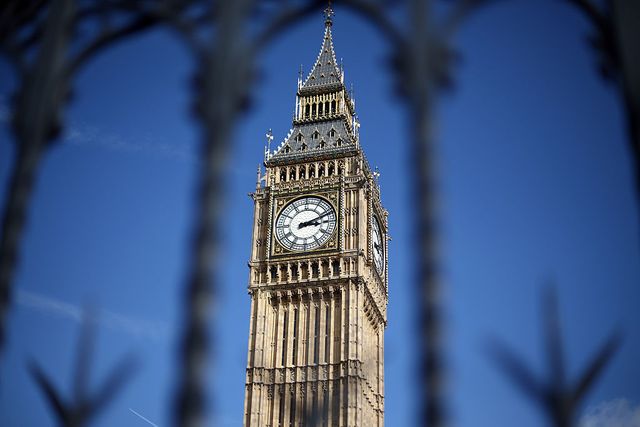First Hollywood was rocked by allegations in the wake of the Harvey Weinstein scandal, and now politics is under the spotlight.
Westminster is currently engulfed in a growing scandal as nearly 40 MPs, including Cabinet and former Cabinet ministers, are accused of inappropriate behaviour.
So, how did it start?
The website Guido Fawkes revealed a group of Westminster researchers had compiled a list of nearly 40 Conservative MPs, including several members of Theresa May's Cabinet, who have had allegations made against them over the last five years.
What are the allegations?
Several news outlets have seen the unredacted document, including The Times, Business Insider and The Sun. Though the claims are mostly unverified, accusations range from affairs to specific allegations and include sexual harassment, unwanted advances, forcing staff to have abortions and paying women to stay quiet.
For example, one Minister was said to be 'handsy with women at parties' while another backbencher has been described as 'perpetually intoxicated and very inappropriate with women'.
One Tory MP is allegedly nicknamed 'Copperfeel' and another is said to have tried to take three female aides on holiday.
The list accused two MPs of using the services of prostitutes while a well-known female MP is accused of having extramarital sex with young male researchers. The document also reveals a number of alleged affairs between members of the government as well as alleged 'odd sexual acts' by senior figures. A video of one of these acts is allegedly circulating in Westminster.
Much of it falls into the category of private acts between consenting adults. However, one of the most serious claims to emerge over the last few days has come from Dwyfor Meirionnydd MP Liz Saville Roberts.
The Plaid Cymru MP told the Commons: 'A worker employed as staff of a Member in this House told me today she reported being sexually assaulted to the proper authorities earlier this year who did nothing. She is deeply disappointed and distrustful and she tells me that distrust is endemic.'
The news comes after The Sun reported that female staff in Parliament had used a WhatsApp group to list 'sex-pest' MPs to avoid. Members of the group include parliamentary researchers, secretaries and aides who told each other which people were 'not safe in taxis' and who not to 'get in a lift with'.
Have many MPs been named?
Six Cabinet ministers were named in the dossier. Perhaps garnering the most attention is International Trade Minister Mark Garnier, who is reported to have asked his then-secretary to buy sex toys and called her 'sugar t*ts'.
Garnier is reported to have said that while his actions, which are understood to date back to 2010, could look like 'dinosaur behaviour' it 'absolutely does not constitute harassment'. He also said the use of the name 'sugar t*ts' was part of 'an amusing conversation' and referenced the BBC sitcom Gavin and Stacey.
Former Welsh Secretary Stephen Crabb has reportedly admitted sending 'explicit' messages to a 19-year-old after a job interview who applied to work in his Commons office.
He was quoted saying: 'I accept any kind of sexual chatter like this is totally wrong and I am sorry for my actions.'
Defence Secretary Sir Michael Fallon admitted inappropriately touching the knee of journalist Julia Hartley-Brewerto. Days after the allegations surfaced, he resigned by from his position saying his conduct had 'fallen short; of the required standards after allegations of inappropriate sexual behaviour.
He told the BBC that what had been 'acceptable 15, 10 years ago is clearly not acceptable now'.
Broadcaster and commentator Julia Hartley-Brewer said she did not regard it as 'anything but mildly amusing'.
Hartley-Brewer tweeted: 'This 'incident' happened in 2002. No one was remotely upset or distressed by it. My knees remain intact.'
In his resignation letter, Fallon said a number of allegations that had surfaced about MPs, including himself, had been false, but added: 'I accept that in the past I have fallen below the high standards that we require of the Armed Forces that I have the honour to represent.'
Did Theresa May know about the alleged misconduct?
A spokesperson for Theresa May repeatedly refused to say when the prime minister first heard about the allegations.
May's spokesman told Business Insider that May acted once the allegations were 'made public' but was unable to say when the prime minister was first informed about them.
The Prime Minister said she is 'very concerned' by allegations of sexual harassment and vowed to take 'serious action', adding that 'unwanted sexual behaviour' is 'completely unacceptable' and urged victims to go to the Parliamentary authorities and the police.
ITV Political Editor Robert Peston stated: 'For May the big risk is that the story moves to how long she has known about the alleged misconduct, via her Whip's office, and why she didn't move earlier to deter and punish.
'Since time immemorial prime ministers and their whips have gathered intelligence about the flaws and transgressions of MPs as a way of enforcing loyalty. But that is not a good look for a prime minister who has said so much about wanting to stamp out gender discrimination, bullying and the abuse of the vulnerable.'
Commons leader Andrea Leadsom vowed to stamp out 'sleazy, sexist or homophobic banter', while Labour leader Jeremy Corbyn claimed there was a 'warped and degrading culture' that 'exists and thrives in the corridors of power, including in Westminster'.
What does this tell us about how politics works today?
At the centre of the scandal is the role of 'government whips', who are MPs appointed by party leaders to make sure MPs in their party vote the right way. They are often referred to as 'enforcers' because they have a close relationship with party leaders and have a lot of influence.
By voting as they're told, and earning the trust of the whips, junior MPs hoping to be promoted in the future can improve their career prospects. In the same vein, MPs who defy the whip on key issues can damage their reputation and limit their chances of making it to the top.
But it gets a lot darker than that. Every whip reportedly possesses a 'black book' containing information they've gathered on MPs, which they have been known to refer to when they need to pressure an MP into voting in a certain way.
There is concern that parties do not stamp out evidence of bad behaviour by MPs and instead use it to enforce their loyalty.
Former Labour adviser Ayesha Hazarika described concerns about the role of Whips, telling Newsnight: 'Every Whip's office will have a big black file on MPs – and that will include bad behaviour, including sexual harassment. Sometimes there has been a feeling the whip's office know there are people doing bad behaviour, whether it's drinking too much or being inappropriate – but they're not actually going to do anything in terms of disciplining these people. They'll use that information to help them when it comes to leveraging them to vote in a certain way.'
There is growing pressure to ensure MPs' staff have adequate protection. A key concern is people who work for an MP are technically that MP's employee and are not covered by the grievance procedure in place for other parliamentary staff.
Which is why May wrote to the Speaker of the House of Commons, John Bercow, calling on him to establish an independent mediation service for staff wanting to raise concerns about MPs' behaviour.
The shadow home secretary, Diane Abbott, told the BBC's Andrew Marr that the culture was even worse 30 years ago when she was first elected.
'There was harassment, there were jokes which weren't that funny – it was partly to do with the fact it was a very male environment – 650 MPs, when I went there just 20-odd women.'
Why are people calling it a 'witch-hunt'?
Conservative MP Michael Fabricant told Newsnight: 'It's not fair to base things on rumour, there has to be evidence. I feel there is a growing witch-hunt mentality currently going on.'
Former health minister Edwina Currie, who had a relationship with John Major, told the BBC that it should be acceptable to 'make a pass' at work. 'This is an attempt to shame all sorts of people who have done absolutely nothing wrong.'
She argued: 'You have to learn the language of making the approach and you have to learn the language of repelling it without upsetting people and without creating an atmosphere.'
Hartley Brewer also commented on the 'media frenzy' surrounding the allegations and described it as a 'Westminster witch hunt'.
So, what next?
The scandal is expected to spread further over the coming days with at least four Labour MPs also accused of harassing young women who work in Westminster, including two who have at some point served in leader Jeremy Corbyn's shadow Cabinet.
Tory activist Kate Maltby wrote in The Times that Theresa May's deputy, Damian Green, 'fleetingly' touched her knee in a pub in 2015, and in 2016 sent her a 'suggestive' text message.
Green has said allegations of inappropriate behaviour 'completely false' and has instructed libel lawyers over the claims, says the BBC.
Similarly, Labour activist Bex Bailey has said she was raped at a party event and that a senior Labour official (though not an MP) discouraged her from reporting the attack.
She was told reporting the 2011 incident could 'damage' her and was given no advice on what she should do next. She said she had 'tried to pretend it hadn't happened' and did not report the attack to the police at the time.
'I don't think I was even given a cup of tea,' she said.
Labour said it had launched an independent investigation.
The latest allegations to emerge














